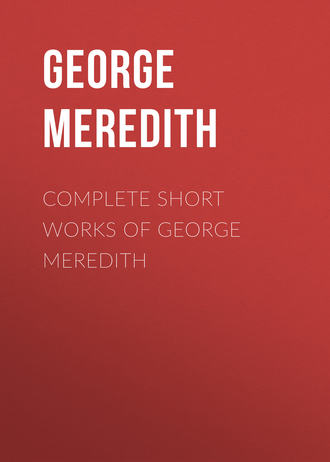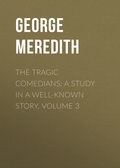
George Meredith
Complete Short Works of George Meredith
SCENE IV
DAME DRESDEN, LADY OLDLACE, VIRGINIA, WINIFRED, ARDEN, SWITHIN, OSIER
LADY OLDLACE: Such perfect rhythm!
WINIFRED: Such oratory!
LADY OLDLACE: A master hand. I was in a trance from the first sentence to the impressive close.
OSIER: Such oratory is a whole orchestral symphony.
VIRGINIA: Such command of intonation and subject!
SWITHIN: That resonant voice!
LADY OLDLACE: Swithin, his flow of eloquence! He launched forth!
SWITHIN: Like an eagle from a cliff.
OSIER: The measure of the words was like a beat of wings.
SWITHIN: He makes poets of us.
DAME DRESDEN: Spiral achieved his pinnacle to-day!
VIRGINIA: How treacherous is our memory when we have most the longing to recall great sayings!
OSIER: True, I conceive that my notes will be precious.
WINIFRED: You could take notes!
LADY OLDLACE: It seems a device for missing the quintessential.
SWITHIN: Scraps of the body to the loss of the soul of it. We can allow that our friend performed good menial service.
WINIFRED: I could not have done the thing.
SWITHIN: In truth; it does remind one of the mess of pottage.
LADY OLDLACE: One hardly felt one breathed.
VIRGINIA: I confess it moved me to tears.
SWITHIN: There is a pathos for us in the display of perfection. Such subtle contrast with our individual poverty affects us.
WINIFRED: Surely there were passages of a distinct and most exquisite pathos.
LADY OLDLACE: As in all great oratory! The key of it is the pathos.
VIRGINIA: In great oratory, great poetry, great fiction; you try it by the pathos. All our critics agree in stipulating for the pathos. My tears were no feminine weakness, I could not be a discordant instrument.
SWITHIN: I must make confession. He played on me too.
OSIER: We shall be sensible for long of that vibration from the touch of a master hand.
ARDEN: An accomplished player can make a toy-shop fiddle sound you a Stradivarius.
DAME DRESDEN: Have you a right to a remark, Mr. Arden? What could have detained you?
ARDEN: Ah, Dame. It may have been a warning that I am a discordant instrument. I do not readily vibrate.
DAME DRESDEN: A discordant instrument is out of place in any civil society. You have lost what cannot be recovered.
ARDEN: There are the notes.
OSIER: Yes, the notes.
SWITHIN: You can be satisfied with the dog’s feast at the table, Mr. Arden!
OSIER: Ha!
VIRGINIA: Never have I seen Astraea look sublimer in her beauty than with her eyes uplifted to the impassioned speaker, reflecting every variation of his tones.
ARDEN: Astraea!
LADY OLDLACE: She was entranced when he spoke of woman descending from her ideal to the gross reality of man.
OSIER: Yes, yes. I have the words [reads]: ‘Woman is to the front of man, holding the vestal flower of a purer civilization. I see,’ he says, ‘the little taper in her hands transparent round the light, against rough winds.’
DAME DRESDEN: And of Astraea herself, what were the words? ‘Nature’s dedicated widow.’
SWITHIN: Vestal widow, was it not?
VIRGINIA: Maiden widow, I think.
DAME DRESDEN: We decide for ‘dedicated.’
WINIFRED: Spiral paid his most happy tribute to the memory of her late husband, the renowned Professor Towers.
VIRGINIA: But his look was at dear Astraea.
ARDEN: At Astraea? Why?
VIRGINIA: For her sanction doubtless.
ARDEN: Ha!
WINIFRED: He said his pride would ever be in his being received as the successor of Professor Towers.
ARDEN: Successor!
SWITHIN: Guardian was it not?
OSIER: Tutor. I think he said.
(The three gentlemen consult Osier’s notes uneasily.)
DAME DRESDEN: Our professor must by this time have received in full Astraea’s congratulations, and Lyra is hearing from her what it is to be too late. You will join us at the luncheon table, if you do not feel yourself a discordant instrument there, Mr. Arden?
ARDEN (going to her): The allusion to knife and fork tunes my strings instantly, Dame.
DAME DRESDEN: You must help me to-day, for the professor will be tired, though we dare not hint at it in his presence. No reference, ladies, to the great speech we have been privileged to hear; we have expressed our appreciation and he could hardly bear it.
ARDEN: Nothing is more distasteful to the orator!
VIRGINIA: As with every true genius, he is driven to feel humbly human by the exultation of him.
SWITHIN: He breathes in a rarified air.
OSIER: I was thrilled, I caught at passing beauties. I see that here and there I have jotted down incoherencies, lines have seduced me, so that I missed the sequence—the precious part. Ladies, permit me to rank him with Plato as to the equality of women and men.
WINIFRED: It is nobly said.
OSIER: And with the Stoics, in regard to celibacy.
(By this time all the ladies have gone into the house.)
ARDEN: Successor! Was the word successor?
(ARDEN, SWITHIN, and OSIER are excitedly searching the notes when SPIRAL passes and strolls into the house. His air of self-satisfaction increases their uneasiness they follow him. ASTRAEA and LYRA come down the path.)
SCENE V
ASTRAEA, LYRA
LYRA: Oh! Pluriel, ask me of him! I wish I were less sure he would not be at the next corner I turn.
ASTRAEA: You speak of your husband strangely, Lyra.
LYRA: My head is out of a sack. I managed my escape from him this morning by renouncing bath and breakfast; and what a relief, to be in the railway carriage alone! that is, when the engine snorted. And if I set eyes on him within a week, he will hear some truths. His idea of marriage is, the taking of the woman into custody. My hat is on, and on goes Pluriel’s. My foot on the stairs; I hear his boot behind me. In my boudoir I am alone one minute, and then the door opens to the inevitable. I pay a visit, he is passing the house as I leave it. He will not even affect surprise. I belong to him, I am cat’s mouse. And he will look doating on me in public. And when I speak to anybody, he is that fearful picture of all smirks. Fling off a kid glove after a round of calls; feel your hand—there you have me now that I am out of him for my half a day, if for as long.
ASTRAEA: This is one of the world’s happy marriages!
LYRA: This is one of the world’s choice dishes! And I have it planted under my nostrils eternally. Spare me the mention of Pluriel until he appears; that’s too certain this very day. Oh! good husband! good kind of man! whatever you please; only some peace, I do pray, for the husband-haunted wife. I like him, I like him, of course, but I want to breathe. Why, an English boy perpetually bowled by a Christmas pudding would come to loathe the mess.
ASTRAEA: His is surely the excess of a merit.
LYRA: Excess is a poison. Excess of a merit is a capital offence in morality. It disgusts, us with virtue. And you are the cunningest of fencers, tongue, or foils. You lead me to talk of myself, and I hate the subject. By the way, you have practised with Mr. Arden.
ASTRAEA: A tiresome instructor, who lets you pass his guard to compliment you on a hit.
LYRA: He rather wins me.
ASTRAEA: He does at first.
LYRA: Begins Plurielizing, without the law to back him, does he?
ASTRAEA: The fencing lessons are at an end.
LYRA: The duetts with Mr. Swithin’s violoncello continue?
ASTRAEA: He broke through the melody.
LYRA: There were readings in poetry with Mr. Osier, I recollect.
ASTRAEA: His own compositions became obtrusive.
LYRA: No fencing, no music, no poetry! no West Coast of Africa either, I suppose.
ASTRAEA: Very well! I am on my defence. You at least shall not misunderstand me, Lyra. One intense regret I have; that I did not live in the time of the Amazons. They were free from this question of marriage; this babble of love. Why am I so persecuted? He will not take a refusal. There are sacred reasons. I am supported by every woman having the sense of her dignity. I am perverted, burlesqued by the fury of wrath I feel at their incessant pursuit. And I despise Mr. Osier and Mr. Swithin because they have an air of pious agreement with the Dame, and are conspirators behind their mask.
LYRA: False, false men!
ASTRAEA: They come to me. I am complimented on being the vulnerable spot.
LYRA: The object desired is usually addressed by suitors, my poor Astraea!
ASTRAEA: With the assumption, that as I am feminine I must necessarily be in the folds of the horrible constrictor they call Love, and that I leap to the thoughts of their debasing marriage.
LYRA: One of them goes to Mr. Homeware.
ASTRAEA: All are sent to him in turn. He can dispose of them.
LYRA: Now that is really masterly fun, my dear; most creditable to you! Love, marriage, a troop of suitors, and uncle Homeware. No, it would not have occurred to me, and—I am considered to have some humour. Of course, he disposes of them. He seemed to have a fairly favourable opinion of Mr. Arden.
ASTRAEA: I do not share it. He is the least respectful of the sentiments entertained by me. Pray, spare me the mention of him, as you say of your husband. He has that pitiful conceit in men, which sets them thinking that a woman must needs be susceptible to the declaration of the mere existence of their passion. He is past argument. Impossible for him to conceive a woman’s having a mind above the conditions of her sex. A woman, according to him, can have no ideal of life, except as a ball to toss in the air and catch in a cup. Put him aside.... We creatures are doomed to marriage, and if we shun it, we are a kind of cripple. He is grossly earthy in his view of us. We are unable to move a step in thought or act unless we submit to have a husband. That is his reasoning. Nature! Nature! I have to hear of Nature! We must be above Nature, I tell him, or, we shall be very much below. He is ranked among our clever young men; and he can be amusing. So far he passes muster; and he has a pleasant voice. I dare say he is an uncle Homeware’s good sort of boy. Girls like him. Why does he not fix his attention upon one of them; Why upon me? We waste our time in talking of him.... The secret of it is, that he has no reverence. The marriage he vaunts is a mere convenient arrangement for two to live together under command of nature. Reverence for the state of marriage is unknown to him. How explain my feeling? I am driven into silence. Cease to speak of him.... He is the dupe of his eloquence—his passion, he calls it. I have only to trust myself to him, and—I shall be one of the world’s married women! Words are useless. How am I to make him see that it is I who respect the state of marriage by refusing; not he by perpetually soliciting. Once married, married for ever. Widow is but a term. When women hold their own against him, as I have done, they will be more esteemed. I have resisted and conquered. I am sorry I do not share in the opinion of your favourite.
LYRA: Mine?
ASTRAEA: You spoke warmly of him.
LYRA: Warmly, was it?
ASTRAEA: You are not blamed, my dear: he has a winning manner.
LYRA: I take him to be a manly young fellow, smart enough; handsome too.
ASTRAEA: Oh, he has good looks.
LYRA: And a head, by repute.
ASTRAEA: For the world’s work, yes.
LYRA: Not romantic.
ASTRAEA: Romantic ideas are for dreamy simperers.
LYRA: Amazons repudiate them.
ASTRAEA: Laugh at me. Half my time I am laughing at myself. I should regain my pride if I could be resolved on a step. I am strong to resist; I have not strength to move.
LYRA: I see the sphinx of Egypt!
ASTRAEA: And all the while I am a manufactory of gunpowder in this quiet old-world Sabbath circle of dear good souls, with their stereotyped interjections, and orchestra of enthusiasms; their tapering delicacies: the rejoicing they have in their common agreement on all created things. To them it is restful. It spurs me to fly from rooms and chairs and beds and houses. I sleep hardly a couple of hours. Then into the early morning air, out with the birds; I know no other pleasure.
LYRA: Hospital work for a variation: civil or military. The former involves the house-surgeon: the latter the grateful lieutenant.
ASTRAEA: Not if a woman can resist… I go to it proof-armoured.
LYRA: What does the Dame say?
ASTRAEA: Sighs over me! Just a little maddening to hear.
LYRA: When we feel we have the strength of giants, and are bidden to sit and smile! You should rap out some of our old sweet-innocent garden oaths with her—‘Carnation! Dame!’ That used to make her dance on her seat.—‘But, dearest Dame, it is as natural an impulse for women to have that relief as for men; and natural will out, begonia! it will!’ We ran through the book of Botany for devilish objurgations. I do believe our misconduct caused us to be handed to the good man at the altar as the right corrective. And you were the worst offender.
ASTRAEA: Was I? I could be now, though I am so changed a creature.
LYRA: You enjoy the studies with your Spiral, come!
ASTRAEA: Professor Spiral is the one honest gentleman here. He does homage to my principles. I have never been troubled by him: no silly hints or side-looks—you know, the dog at the forbidden bone.
LYRA: A grand orator.
ASTRAEA: He is. You fix on the smallest of his gifts. He is intellectually and morally superior.
LYRA: Praise of that kind makes me rather incline to prefer his inferiors. He fed gobble-gobble on your puffs of incense. I coughed and scraped the gravel; quite in vain; he tapped for more and more.
ASTRAEA: Professor Spiral is a thinker; he is a sage. He gives women their due.
LYRA: And he is a bachelor too—or consequently.
ASTRAEA: If you like you may be as playful with me as the Lyra of our maiden days used to be. My dear, my dear, how glad I am to have you here! You remind me that I once had a heart. It will beat again with you beside me, and I shall look to you for protection. A novel request from me. From annoyance, I mean. It has entirely altered my character. Sometimes I am afraid to think of what I was, lest I should suddenly romp, and perform pirouettes and cry ‘Carnation!’ There is the bell. We must not be late when the professor condescends to sit for meals.
LYRA: That rings healthily in the professor.
ASTRAEA: Arm in arm, my Lyra.
LYRA: No Pluriel yet!
(They enter the house, and the time changes to evening of the same day. The scene is still the garden.)
SCENE VI
ASTRAEA, ARDEN
ASTRAEA: Pardon me if I do not hear you well.
ARDEN: I will not even think you barbarous.
ASTRAEA: I am. I am the object of the chase.
ARDEN: The huntsman draws the wood, then, and not you.
ASTRAEA: At any instant I am forced to run,
Or turn in my defence: how can I be
Other than barbarous? You are the cause.
ARDEN: No: heaven that made you beautiful’s the cause.
ASTRAEA: Say, earth, that gave you instincts. Bring me down
To instincts! When by chance I speak awhile
With our professor, you appear in haste,
Full cry to sight again the missing hare.
Away ideas! All that’s divinest flies!
I have to bear in mind how young you are.
ARDEN: You have only to look up to me four years,
Instead of forty!
ASTRAEA: Sir?
ARDEN There’s my misfortune!
And worse that, young, I love as a young man.
Could I but quench the fire, I might conceal
The youthfulness offending you so much.
ASTRAEA: I wish you would. I wish it earnestly.
ARDEN: Impossible. I burn.
ASTRAEA: You should not burn.
ARDEN ‘Tis more than I. ‘Tis fire. It masters will.
You would not say I should not’ if you knew fire.
It seizes. It devours.
ASTRAEA: Dry wood.
ARDEN: Cold wit!
How cold you can be! But be cold, for sweet
You must be. And your eyes are mine: with them
I see myself: unworthy to usurp
The place I hold a moment. While I look
I have my happiness.
ASTRAEA: You should look higher.
ARDEN: Through you to the highest. Only through you!
Through you
The mark I may attain is visible,
And I have strength to dream of winning it.
You are the bow that speeds the arrow: you
The glass that brings the distance nigh. My world
Is luminous through you, pure heavenly,
But hangs upon the rose’s outer leaf,
Not next her heart. Astraea! my own beloved!
ASTRAEA: We may be excellent friends. And I have faults.
ARDEN: Name them: I am hungering for more to love.
ASTRAEA: I waver very constantly: I have
No fixity of feeling or of sight.
I have no courage: I can often dream
Of daring: when I wake I am in dread.
I am inconstant as a butterfly,
And shallow as a brook with little fish!
Strange little fish, that tempt the small boy’s net,
But at a touch straight dive! I am any one’s,
And no one’s! I am vain.
Praise of my beauty lodges in my ears.
The lark reels up with it; the nightingale
Sobs bleeding; the flowers nod; I could believe
A poet, though he praised me to my face.
ARDEN: Never had poet so divine a fount
To drink of!
ASTRAEA: Have I given you more to love
ARDEN: More! You have given me your inner mind,
Where conscience in the robes of Justice shoots
Light so serenely keen that in such light
Fair infants, I newly criminal of earth,’
As your friend Osier says, might show some blot.
Seraphs might! More to love? Oh! these dear faults
Lead you to me like troops of laughing girls
With garlands. All the fear is, that you trifle,
Feigning them.
ASTRAEA: For what purpose?
ARDEN: Can I guess? ASTRAEA:
I think ‘tis you who have the trifler’s note.
My hearing is acute, and when you speak,
Two voices ring, though you speak fervidly.
Your Osier quotation jars. Beware!
Why were you absent from our meeting-place
This morning?
ARDEN: I was on the way, and met
Your uncle Homeware
ASTRAEA: Ah!
ARDEN: He loves you.
ASTRAEA: He loves me: he has never understood.
He loves me as a creature of the flock;
A little whiter than some others.
Yes; He loves me, as men love; not to uplift;
Not to have faith in; not to spiritualize.
For him I am a woman and a widow
One of the flock, unmarked save by a brand.
He said it!—You confess it! You have learnt
To share his error, erring fatally.
ARDEN: By whose advice went I to him?
ASTRAEA: By whose?
Pursuit that seemed incessant: persecution.
Besides, I have changed since then: I change; I change;
It is too true I change. I could esteem
You better did you change. And had you heard
The noble words this morning from the mouth
Of our professor, changed were you, or raised
Above love-thoughts, love-talk, and flame and flutter,
High as eternal snows. What said he else,
My uncle Homeware?
ARDEN: That you were not free:
And that he counselled us to use our wits.
ASTRAEA: But I am free I free to be ever free!
My freedom keeps me free! He counselled us?
I am not one in a conspiracy.
I scheme no discord with my present life.
Who does, I cannot look on as my friend.
Not free? You know me little. Were I chained,
For liberty I would sell liberty
To him who helped me to an hour’s release.
But having perfect freedom…
ARDEN: No.
ASTRAEA: Good sir,
You check me?
ARDEN: Perfect freedom?
ASTRAEA: Perfect!
ARDEN: No!
ASTRAEA: Am I awake? What blinds me?
ARDEN: Filaments
The slenderest ever woven about a brain
From the brain’s mists, by the little sprite called
Fancy.
A breath would scatter them; but that one breath
Must come of animation. When the heart
Is as, a frozen sea the brain spins webs.
ASTRAEA: ‘Tis very singular!
I understand.
You translate cleverly. I hear in verse
My uncle Homeware’s prose. He has these notions.
Old men presume to read us.
ARDEN: Young men may.
You gaze on an ideal reflecting you
Need I say beautiful? Yet it reflects
Less beauty than the lady whom I love
Breathes, radiates. Look on yourself in me.
What harm in gazing? You are this flower
You are that spirit. But the spirit fed
With substance of the flower takes all its bloom!
And where in spirits is the bloom of the flower?
ASTRAEA: ‘Tis very singular. You have a tone
Quite changed.
ARDEN: You wished a change. To show you, how
I read you…
ASTRAEA: Oh! no, no. It means dissection.
I never heard of reading character
That did not mean dissection. Spare me that.
I am wilful, violent, capricious, weak,
Wound in a web of my own spinning-wheel,
A star-gazer, a riband in the wind…
ARDEN: A banner in the wind! and me you lead,
And shall! At least, I follow till I win.
ASTRAEA: Forbear, I do beseech you.
ARDEN: I have had
Your hand in mine.
ASTRAEA: Once.
ARDEN: Once!
Once! ‘twas; once, was the heart alive,
Leaping to break the ice. Oh! once, was aye
That laughed at frosty May like spring’s return.
Say you are terrorized: you dare not melt.
You like me; you might love me; but to dare,
Tasks more than courage. Veneration, friends,
Self-worship, which is often self-distrust,
Bar the good way to you, and make a dream
A fortress and a prison.
ASTRAEA: Changed! you have changed
Indeed. When you so boldly seized my hand
It seemed a boyish freak, done boyishly.
I wondered at Professor Spiral’s choice
Of you for an example, and our hope.
Now you grow dangerous. You must have thought,
And some things true you speak-save ‘terrorized.’
It may be flattering to sweet self-love
To deem me terrorized.—‘Tis my own soul,
My heart, my mind, all that I hold most sacred,
Not fear of others, bids me walk aloof.
Who terrorizes me? Who could? Friends? Never!
The world? as little. Terrorized!
ARDEN: Forgive me.
ASTRAEA: I might reply, Respect me. If I loved,
If I could be so faithless as to love,
Think you I would not rather noise abroad
My shame for penitence than let friends dwell
Deluded by an image of one vowed
To superhuman, who the common mock
Of things too human has at heart become.
ARDEN: You would declare your love?
ASTRAEA: I said, my shame.
The woman that’s the widow is ensnared,
Caught in the toils! away with widows!—Oh!
I hear men shouting it.
ARDEN: But shame there’s none
For me in loving: therefore I may take
Your friends to witness? tell them that my pride
Is in the love of you?
ASTRAEA: ‘Twill soon bring
The silence that should be between us two,
And sooner give me peace.
ARDEN: And you consent?
ASTRAEA: For the sake of peace and silence I consent,
You should be warned that you will cruelly
Disturb them. But ‘tis best. You should be warned
Your pleading will be hopeless. But ‘tis best.
You have my full consent. Weigh well your acts,
You cannot rest where you have cast this bolt
Lay that to heart, and you are cherished, prized,
Among them: they are estimable ladies,
Warmest of friends; though you may think they soar
Too loftily for your measure of strict sense
(And as my uncle Homeware’s pupil, sir,
In worldliness, you do), just minds they have:
Once know them, and your banishment will fret.
I would not run such risks. You will offend,
Go near to outrage them; and perturbate
As they have not deserved of you. But I,
Considering I am nothing in the scales
You balance, quite and of necessity
Consent. When you have weighed it, let me hear.
My uncle Homeware steps this way in haste.
We have been talking long, and in full view!






